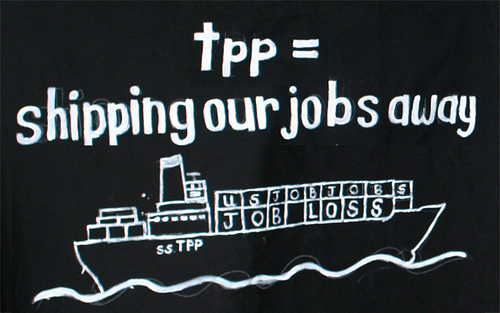Activists take on ’NAFTA on steroids’

Communication Workers of America | Jun 28, 2012
Activists take on ‘NAFTA on steroids’
CWA, environmental and consumer allies are gearing up for the next round of negotiations for the Trans Pacific Partnership (TPP), a mega-trade deal that so far is being negotiated in secrecy and threatens more U.S. jobs and our environment.
Trade negotiators will meet in San Diego, July 2-10, but just as in Dallas last month, they’ll face a strong turnout by activists from CWA, the Sierra Club, Citizens Trade Campaign, Public Citizen and others who oppose the deal because of the lack of transparency, accountability and public access to the proposals being discussed.
The trade deal is sometimes called "NAFTA on steroids," because if ratified, it will be the biggest free trade agreement in the world. Check out this video that talks about why this trade deal is a corporate tool of the 1 percent.
"The 1% has total access to all negotiating documents, while the 99% is shut out. This is not what democracy looks like," said CWA President Larry Cohen. "The 1% will lower labor standards and eliminate environmental safeguards, further chaining our economy to that of Vietnam which has one of the worst labor rights records in the world. It’s important to negotiate a trade agreement that protects U.S. workers and our environment."
The US Trade Representative has given some 600 corporate lobbyists and representatives of the U.S. Chamber of Commerce regular online access to the TPP negotiating drafts as "cleared advisors," but continues to block and restrict access to members of Congress and the public.
This week, 133 Members of Congress delivered a letter to United States Trade Ambassador Ron Kirk pressing him to support transparency and openness in the Trans-Pacific Partnership (TPP) negotiations. Read the letter here (pdf).





